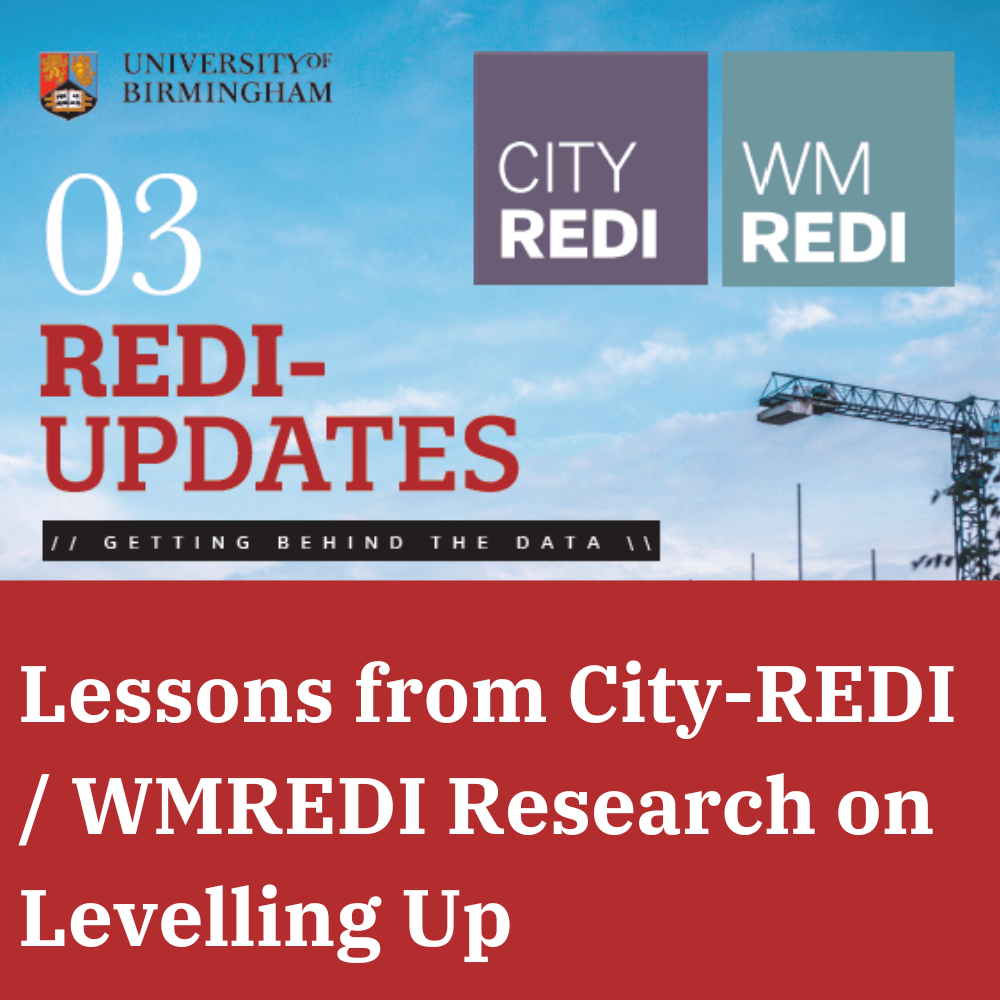
Welcome to REDI-Updates. REDI-Updates aims to get behind the data and translate it into understandable terms. In this edition, WMREDI staff look at the government's flagship policy - Levelling Up. We look at the challenge of implementing, understanding and measuring levelling up. Rebecca Riley summarises some of the key points to come out of our research on Levelling Up. View REDI-Updates.

Our extensive research across the thematic areas covered by the Levelling Up White Paper, and our embeddedness with place partners give us, as a research institute, a unique position to be able to comment on the vision and practicality of the White Paper.
Our mix of academic expertise in sustainable regional economic development and our applied research co-created with regional partners means we have a robust approach to evidence and business case development and to monitoring and evaluation. We are also at the forefront of understanding the role of universities and are not only researching these core elements of levelling up but we are fundamentally embedding universities into understanding places. This report reflects that knowledge, experience and capacity. The key points raised in the report point us towards how the implementation phase of the Levelling Up White Paper could be strengthened and could create real change at a local level.
Our work highlights a number of issues which need to be addressed:
Funding
- Generally, competition is bad for places: it stifles partnership working and encourages piecemeal bidding and a lack of long-term investment which is needed to address structural issues raised in the White Paper. Small competitive pots are also no replacement for long-term investment in place to address structural inequalities and the general reduction in local budgets. Specific national objectives may not fit local areas or address key local needs. Place partnerships need to be trusted to deliver to the needs of the area, people and businesses they represent.
- It is very difficult to trace and understand the combined impacts of funding. The majority of the funding announcements in the White Paper are not new. Hence the distribution and management of scarce resources are extremely important.

Competition for Funds
- The process of competition also wastes public resources. It diverts them from delivery and action to writing bids and business cases for national government, which in turn absorbs national government resources which could be better spent on bigger programmes and embedded evaluation and learning. A proliferation of small pots also increases administration and prevents investment in teams that can manage and deliver programmes in the long term, as there is no certainty of funding for these roles and functions.
A top-down approach to funding
- There is a proliferation of local strategies, often spurred by national activity, that does not always follow through with funding, as this is dependent on what is won at the local level. Places often have a good understanding of what needs to be done but lack the levers and resources to act and make a difference. Ideas might need to be reverse-engineered to fit the funding call. This can have a significant impact on the aims and objectives local partners have identified through research and consultation.
- Competitions have also encouraged pilot-based and experimental projects that often do not transfer into the mainstream. Additionally, evaluation has been limited on impact and transferability to the broader funding streams. Innovation in the delivery of these pilots has also been hit by the short-term, quick turnaround nature of funding, leading to a lack of embeddedness of change as people and capacity are lost as funding ends.
- The levels of central prescription for programmes also hinder innovation and testing at a local level. This can lead to suboptimal allocation of resources to meet local needs. Highly centralised economies lead to greater disparity as they struggle to tackle place-based inequalities from afar, instead of in partnership with places. The gaps in the White Paper around inequality, environment and energy may also divert attention and activity away from these issues which are crucial to local levelling up.
Lack of evaluation
- Funds for evaluation have been dramatically cut back as budgets have reduced, so places find it hard to learn from past activities and build on them. Subsequently, it has been difficult to invest in skills and knowledge. Here at WMREDI, we have found this is a service we have performed across a wide set of programmes and activities, stepping in to fill the gap in capacity, maintain the knowledge base and provide important access to benchmarking comparators outside the local area, building on international work.
Data and monitoring
- Data is scarce at the local level, many of the indicators in the Levelling Up White Paper are not disaggregated to local neighbourhood levels. This poses an ongoing issue for places in understanding what is happening. Many places have also lost their capacity to do analysis in-house and there is a greater reliance on consultancies. This weakens their ability to develop business cases, and deliver, monitor and evaluate programmes.
- Monitoring places requires not just a set of indicators, but also expertise in understanding the drivers of change in the indicators at a local level and how the indicators overlap and interrelate. Many of the indicators in the Levelling Up White Paper are not available at the scale where many social and economic issues manifest themselves. Places will need to do thorough self-assessments of their performance to develop appropriate interventions aligned to the missions. Here the qualitative understanding of place is as important as the broader metrics.
- This is a lack of data, capacity and capability in places which hinders the development and delivery of projects. Funding often goes to places which are already successful, leaving rural, and small towns behind, with the process stacked against them. However, even those successful places, (mostly the large cities across the country) do not perform well relative to their international counterparts.

Anchor institutions, EU funding, Brexit, Covid and other factors
- Anchor institutions, especially universities, which have the multiple functions of research, teaching, upskilling, employment and capital investment, are vital to places. They need investment and encouragement to work together for the benefit of the place. One of the few new announcements in the Levelling Up White Paper is the innovation accelerators linked to firm-level demand which can be harnessed to deliver on levelling up. The redistribution of R&D funding will go some way to addressing the impact universities can have, especially if the focus is on the more applied and embedded, helping places grow and capitalise on the capacity, knowledge and skills of the future.
- At the same time, EU funding is disappearing from the business support and skills development ecosystem, which funds considerable levels of support for growth across the country, and as yet the new funding regime has not been elaborated on. This will significantly affect the landscape for business and individual support for growth and levelling up. It also impacts the ability of institutions like universities to engage locally and deliver programmes for innovation with businesses.
- Brexit and Covid-19 pandemic impacts have disproportionately affected ‘left-behind’ places, largely due to the types of employment such as manufacturing and hospitality which have been heavily hit by furlough, supply chains and illness issues. Going forward, investment in skills and learning at a local level is vital for resilience and growth in places.
- The housing crisis continues, with a chronic undersupply of affordable housing that meets people’s needs. A quarter of the population find it fairly or very difficult to pay housing costs. Although the White Paper addresses this, it still does not go far enough to tackle this level of under-supply and associated affordability issues.

Constant change and the lived experience
- A consistent feature of our research is that constant change and new funds are creating confusion for delivery bodies, individuals and businesses at the local level, making systems difficult to navigate. Insecurity of funding means that local delivery functions cannot invest sufficiently in people for the benefit of place. With yet further institutional reorganisation on the horizon the issue of retention of staff capacity and capability remains live.
- Finally, levelling up is not merely a North-South issue. It is a story of hyper-local disparities that may be disguised at the national level, and which data does not always reveal. The lived experience of the people testifies to this. Hence alongside broader structural factors, local approaches to understanding both the quantitative impacts and the qualitative lived realities are essential to tackling levelling up.
Our latest research for CIPFA on international experiences highlights important lessons for the next stage of development:
- Shared political will and partnerships: each were vital in overcoming political differences and uniting public and private institutions around a common vision.
- Clear strategy and vision: each city set out what it should look and feel like as places to live and work.
- Investing for the long term: a commitment to scale and longevity in funding is imperative.
- Local knowledge: an in-depth understanding of the strengths and weaknesses that drive local economies, and an ability to build on those strengths.
- Monitoring and evaluation: a system that allows for policies and programmes to be regularly sense-checked and updated in a timely way that benefits total performance.
- Adapting national frameworks to address local needs
- Diversification: the ability to design policies that enable growth strategies to take root and thrive relies on the strength of a local narrative.
- Key players: individuals and private organisations can serve as enablers of growth, leading by example.
- Adequate and responsive funding: identifying where and when finance is made available can be as important as the policies themselves.
This blog was written by Rebecca Riley, City-REDI / WMREDI, University of Birmingham.
Disclaimer:
The views expressed in this analysis post are those of the authors and not necessarily those of City-REDI, WMREDI or the University of Birmingham.
